Reflections on the 2024 UN Statistical Commission
by
the Open Data Watch Team
3 March 2024
Since Open Data Watch’s inception ten years ago, our attendance at the United Nations Statistical Commission (UNSC) has been steadfast, with the past week marking yet another successful session. Over the years, we have observed the evolution of official agenda items, witnessed the changing focus of the Friday seminar on emerging issues, and observed the expansion of the side events calendar—mirroring the growth of our data ecosystem. At the end of the 55th UNSC, we take a moment to reflect and catalog our key takeaways from this week’s proceedings, alongside what comes next.
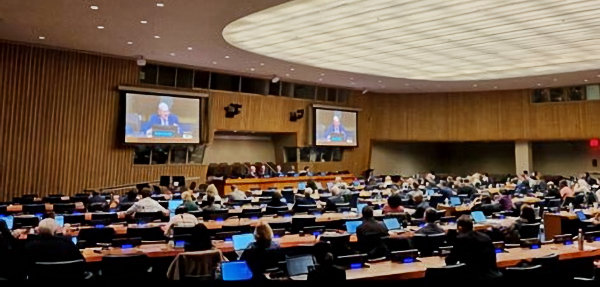
Artificial Intelligence (AI) Integration within Official Statistics: Bridging Divides
While more work remains in bringing together artificial intelligence (AI) and official statistics, numerous sessions this year showcased efforts to integrate these communities. UN Women and the Swiss Federal Statistical Office’s event, entitled “Exploring the Risks and Opportunities of Artificial Intelligence in Advancing Gender Equality” emphasized the need to mitigate gender biases in technology, highlighting biases in both data and algorithms. Ongoing dialogue between the AI and official statistical communities is essential as is acknowledging the diverse capacities of national statistical offices (NSOs) across funding, human resources, and technical capabilities. PARIS21’s event entitled “Data, AI, and the SDGs: How can AI help us achieve and monitor progress?” connected the dots between AI and the reality of many national statistical offices.
Across both events, we noted that transparency and openness in data remain paramount, with open data principles facilitating data input for AI models. Collaborative data governance and interoperability arrangements, such as the UN Data Portal between United Nations Statistics Division (UNSD), World Health Organization (WHO), and UNICEF, was one example we noted this week that shows how better interoperability and governance can help AI deliver a better product to users.
What’s next? The upcoming PARIS21 Spring meeting “Data and AI for Sustainable Development: Building a Smarter Future” in Washington, D.C. on 3-4 April promises further discussion on this topic and is marked on our calendars.
UNSC kicked off the countdown to UN World Data Forum (UNWDF)
During UNSC, we seized the opportunity to engage with data advocates and set the stage for the upcoming UNWDF in November in Medellin, Colombia. Through two key convenings—the UN High-Level Group on Partnership, Coordination, and Capacity Building for Statistics (HLG) and a dedicated side event to the sixth Forum—ODW, in collaboration with PARIS21 and other champions, introduced an ambitious initiative to crowd in commitments to accelerate data-driven progress towards 2030, positioning the UNWDF as the moment for actionable outcomes and transformative change.
What’s next? Alongside the HLG and UNWDF Programme Committee, PARIS21 and Open Data Watch will engage the data community to commit to actionable change. Stay tuned for a webinar on the topic and opportunities to get involved.
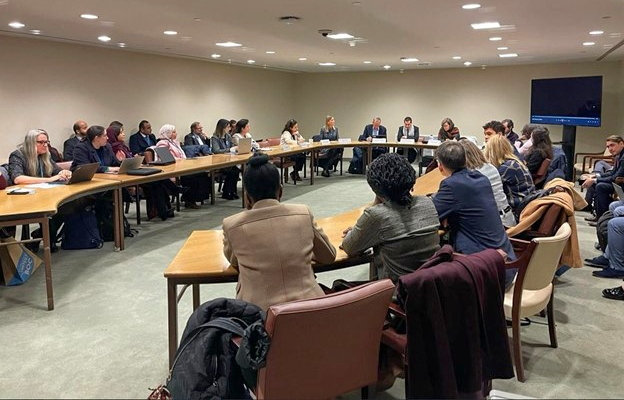
Colleagues listen during the UNSC side event “UN World Data Forum: championing data and statistics with a renewed global action plan” on 29 February.
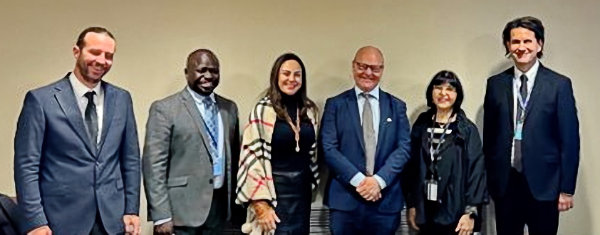
Panelists of the UNSC side event “UN World Data Forum: championing data and statistics with a renewed global action plan” on 29 February pose after the discussions.
Data Stewardship offers a way forward in an ever-evolving data landscape
Data stewardship is essential for managing data resources effectively in our pursuit of inclusive and sustainable development. While NSOs play a crucial role in maintaining data integrity, there’s a need for a global definition and framework to understand how NSOs take on the role of data stewards across the national statistical system. To address this gap, the UNSC established the Data Stewardship Working Group (DSWG) in 2021 and Open Data Watch currently co-chairs the work stream on defining data stewardship within this initiative. The working group developed a global questionnaire to understand different perspectives on how data stewardship is defined and operationalized around the world. Hosted by the UN Working Group on Data Stewardship, the side event “Defining Data Stewardship: A Collaborative Global Discourse” brought together NSO representatives to share insights from the questionnaire, explore emerging areas in data stewardship, and discuss the future role of NSOs as data stewards.
What’s next: The working group will build on the insights learned from the global questionnaire and engagements with countries to further refine and develop a framework to understand and operationalize data stewardship in different contexts.
Citizen-Generated Data (CGD): A Growing Connection with Official Statistics Community
Leveraging citizen data and making it fit for policymaking is a complex area that captured attention this week. Not only do they help fill data gaps and ensure inclusivity, CGD also empowers communities to define themselves and foster data trust. Kenya’s success in reporting several SDG indicators thanks to CGD exemplifies its potential to expedite data availability and close gaps, while Colombia’s experience of supporting indigenous groups in their own data collection efforts demonstrates CGD’s ability for certain communities to take greater ownership of the data about them. But while these are good examples of what’s possible, they do not apply across the board and concerns remain about data quality, sustainability, and capacity constraints faced by civil society organizations and communities in data production, as well as on data privacy, security, standards, and use. The launch of the draft Copenhagen Framework on Citizen Data marks a milestone in advancing the role of CGD within the official statistics community and providing such guidance. This comprehensive framework sets the stage for informed discourse and collaborative action in leveraging CGD’s transformative potential for more and better data. The Collaborative on Citizen Data is tackling the topic and was fully engaged at this year’s session by hosting both a meeting of the Steering Commitee and a public side event
What’s next? The Collaborative will continue to refine the Copenhagen Framework to support the production and utilization of citizen data and gather again at the Expert Group Meeting on Citizen Data in July 2024.
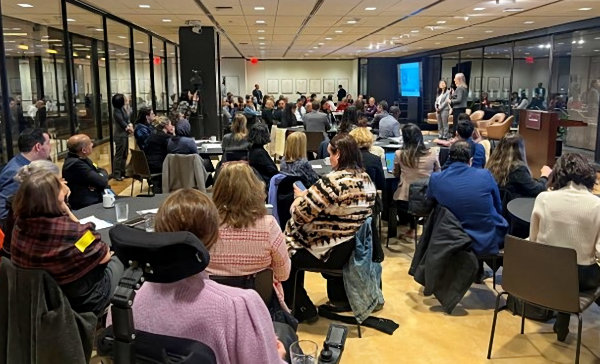
ODW’s Director of Policy and Partnerships, Francesca Perucci, and UNSD’s Chief of SDG Monitoring Yongi Min open the UNSC side event “From Insights to Action: Shaping the Future of Citizen Data” on 26 February.
More work is needed on gender identity in the official statistics world
UNSC includes representatives from national statistical offices of all UN member states. It is complex. It is diverse. And it is unlikely to always agree on certain issues. At this year’s session, certain members of the commission acknowledged the importance of moving beyond the gender binary in data collection and analysis efforts. (See paragraph 43 of the UNSC report) However, overall UNSC has signaled that they think it is still too early to provide guidance on using a more expansive definition of gender in official data collection practices. Regardless of whether the UNSC is ready or not, greater inclusivity within official data systems is needed and it will be up to the advocates and engaged NSOs to move the agenda forward. >
What’s next? ODW strongly advocates for further exploration of this critical area. Our ongoing work on intersectionality with Data2X and the Center for Global Development provides a platform for stakeholders to convene and exchange best practices, fostering a collaborative environment for advancing understanding and action in this domain.
Open data are a means to an end: use and impact
When ODW first attended UNSC a decade ago, discussions on open data were informal and the topic had not yet entered the official agenda. Over the years, we have diligently advocated for the integration of open data principles into formal UN processes, culminating in the endorsement of the “open by default” principle at the 53rd UNSC in 2022. Through these advocacy efforts and more, we are demystifying the concept of open data, shifting the focus from “if” open data is necessary to “how” it can be effectively implemented to optimize data use and impact. In the official UNSC proceedings, this commitment to open data is reflected in a work program that seeks to offer customized capacity development training for countries, as well as continued development of the UN Data portal. Our side event “Maximizing the value of data: from principles to implementation” specifically offered the opportunity for chief statisticians and other partners to discuss strategies for achieving maximum data value and address what the priorities should be in supporting capacity development as ODW, the UN Statistics Division and other partners are about to engage in capacity development activities in countries.
What’s next? Alongside UNSD, we are taking feedback we heard from countries this week and scaling our open data country capacity support and looking forward to meeting the demand for open data within national statistical offices.
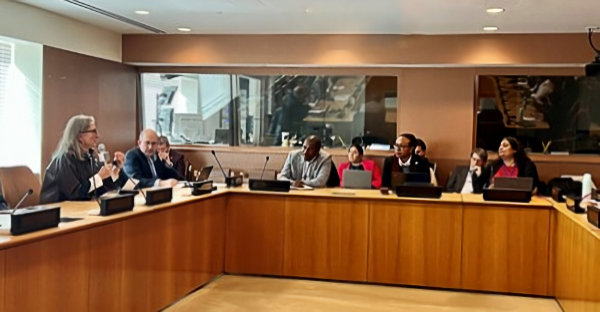
ODW’s Jamison Henniger and Francesca Perucci discuss open data capacity building needs with country representative from Namibia, Jamaica, and the Maldives at the UNSC side event “Maximizing the value of data: from principles to implementation” on 29 February.
It’s time for more time use surveys
There’s a growing acknowledgment of the importance of time-use data in redefining how prosperity is measured and informing various public policies. Despite its recognized significance, time-use data collection remains inadequate. UNSC was a moment to address these challenges; the United Nations Statistics Division and the Expert Group on Innovative and Effective Ways to Collect Time-Use Statistics have been working to modernize time-use surveys and implement the International Classification of Activities for Time-Use Statistics. Our UNSC side event marked the launch of the updated Guide to Producing Statistics on Time Use, which was later endorsed by the Commission. Additionally, ODW contributed to the discourse by producing an article on the global state of time-use data, as revealed by the Gender Data Compass. Shockingly, the Gender Data Compass findings indicate that 73 percent of the 185 assessed countries do not publish data on time spent on unpaid domestic and care work.
What’s next? Collaborating with UN Women and other partners, our aim is to spotlight this issue at the UN World Data Forum in November. While awaiting confirmation on our session proposal, ODW is continuing to leverage the insights from the Gender Data Compass. This involves assisting countries in assessing their capacity for time-use surveys and providing guidance on advancing in this critical area of data for gender equality.
After an energizing week, we are looking forward to building on this momentum to promote innovative data practices to improve lives.







